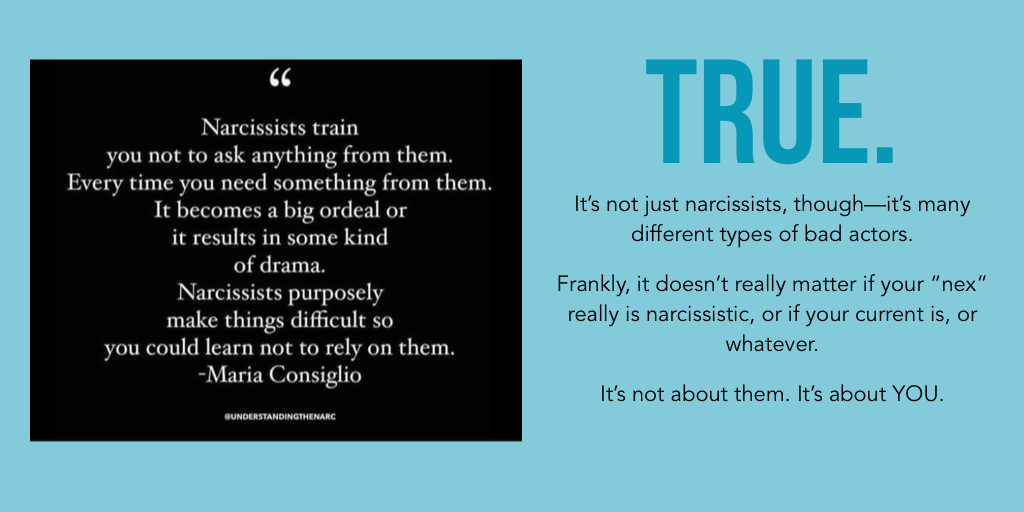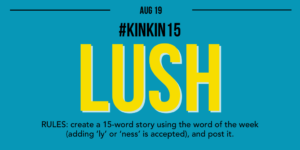Alternatively, they could be super-stressed, or actually incompetent and frustrated that you don’t recognize their struggles.
A friend recently brought this meme to my attention. It says:
“Narcissists train you not to ask anything from them. Every time you need something from them. It becomes a big ordeal or it results in some kind of drama. Narcissists purposefully make things difficult so you could learn to not rely on them.” —Maria Consiglio.
And I went on a short rant, and my friend laughed and said that was exactly why she brought it to me. Because she wanted me to write about it.
So, I went searching for this, and found it on FB, posted with the following statement:
“Narcissists train you not to expect anything from them. By making it difficult for you when you do. They create drama or they just ignore you. But they find ways to get out of being there for you or helping you with anything. It gets so that u stop asking because it becomes an ordeal or your disappointed when you do. And that is exactly what they want. You don’t realize it but slowly they do less and less for you. Until you stop asking.”
I read through the comments there and in other places I found the post.
I saw a lot of people talking about the narcissists in their lives. There is even a term for narcissistic exes: “nex.”
I went further down the rabbit hole and learned even more. Here are a few quotes from the wiki page (https://en.wikipedia.org/wiki/Narcissistic_personality_disorder):
“About one percent of people are believed to be affected with NPD at some point in their lives. It occurs more often in men than women, and typically affects younger as opposed to older people.”
Meaning that this can actually come and go.
“…it is common for children and adolescents to display personality traits that resemble NPD, but such occurrences are usually transient, and register below the clinical criteria for a formal diagnosis of NPD.”
Here I see that it would be pretty easy for a layperson to misdiagnose someone through a set of symptoms.
“The DSM-5 indicates that in order to qualify as symptomatic of NPD the person’s manifested personality traits must substantially differ from social norms.”
In other words, they have to be more than your garden-variety a**hole.
And one more:
“The causes of narcissistic personality disorder are unknown, but theorized to be linked to certain types of traumas.”
This with NPD are not only jerkwads, but are victims, themselves—often of others who might have been NPD or just a**holes.
And while you will likely run into quite a few people in your life with NPD, your “nex” is PROBABLY not one of them, and you don’t know if they were unless you professionally diagnosed them, or they were professionally diagnosed by others.
Your “nex” doesn’t have to be a narcissist to be an a**hole.
Reading a few forums and having a couple bad relationships under your belt does not make you ready to deal with a master manipulator.
UNLESS…
And this is the key: Unless you have done the work on you.
Because when it comes right down to it, it doesn’t matter at all if someone is a narcissist, or if their behavior is a result of another mental illness, stress, incompetence, or if they are just an asshole—if YOUR boundaries are strong.
Let’s look at the traits of a narcissist, and what good personal boundaries might look like to help avoid them (whether they are a narcissist or not):
Has a grandiose sense of self-importance (e.g. exaggerates achievements and talents, expects to be recognized as superior without commensurate achievements).
Doesn’t sound like someone I want to spend much time with.
As soon as someone seems to be exaggerating who they are or what they’ve accomplished, start digging. Look them up. Check them out. Verify what they are saying.
And then, also ask yourself: Do you want to be around someone who focuses that much on making sure you know just how awesome they are?
I generally prefer people who are humble, rather than those who try to put their achievements front and center.
I would guess I weed out quite a few right from the start this way.
Is preoccupied with fantasies of unlimited success, power, brilliance, beauty, or ideal love.
This just seems banal to me.
I enjoy people who live in the real world. Sure, I love people who have dreams! Even risky and crazy dreams. However, as one of those people, I also watch to see what they are doing to pursue those dreams and make them happen.
If their dreams seem unrealistic (whether they are or not is not really your concern), think about whether you really want to stick around.
Because either their dreams ARE unrealistic, or you’re not a good fit for them, and you’ll be a drag on their life that they don’t need if they do have a chance of accomplishing those things.
Believes that they are “special” and unique and can only be understood by, or should associate with, other special or high-status people (or institutions).
Unless you consider yourself “special” or high-status and value those things, maybe don’t try to match yourself with someone who uses those as value indicators of who to interact with.
And if someone shows you that’s who they are, reevaluate whether that’s who you want into your life.
Requires excessive admiration.
If someone requires more admiration than you feel comfortable giving them, reevaluate.
In my view, a relationship is not a success if the effort I have to put in feels excessive just to keep it going.
Has a sense of entitlement (i.e., unreasonable expectations of especially favorable treatment or automatic compliance with their expectations).
AS SOON as someone acts like they have a right to anything you have to offer before you have explicitly given them consent, SHUT THAT SHIT DOWN and see how they act.
- Do they call you “babe” before they even know you?
- Do they expect sex in exchange for dinner?
- Do they treat you like a submissive before you’ve established a dynamic?
- Do they chide you about taking too long to reply to their messages?
If it dings your “Who da f*ck this person think dey are?” instincts, then examine that and shut it down.
If they get upset, they may still not be a narcissist, but they don’t need to be around YOU.
Is interpersonally exploitative (i.e., takes advantage of others to achieve their own ends).
If you see someone taking advantage of others, assume that they will do that to you, given a chance.
No, thank you.
Lacks empathy: is unwilling to recognize or identify with the feelings and needs of others.
When you see others acting without empathy, AND being unwilling to pause and consider how their actions affect others, then seriously consider whether you are willing to have them treat you that way.
Because generally, the way people treat others shows you how they will eventually treat you.
Is often envious of others or believes that others are envious of them.
I’ll admit, I’m often envious of others. It’s something I’ve been dealing with since I was a child.
No idea why.
It’s not debilitating for me. But it’s always there.
And when I see that in others, I can sometimes feel when that’s excessive. And I avoid that.
Because even a tiny bit of envy has led to uncharitable thoughts and actions in my own life in the past. A lot of it just seems gross.
So, tread carefully when people talk a lot about what others have and do, rather than being grateful for their own resources, and what the two you do together.
Shows arrogant, haughty behaviors or attitudes.
Generally, this is red-flag behavior.
It’s my belief (and experience) that those who are truly amazing people are also friendly, approachable, and don’t punch down.
They don’t need to “act” superior to make themselves more. Their behaviors and words help them stand out from a crowd.
One of the challenges in all of this, though, is that nearly all of us will exhibit these traits to one level or another, so when we see them in others, we tend to forgive them, as we would want to be forgiven.
Except that we shouldn’t want to be forgiven in our worst behaviors.
We should want to notice those behaviors and find alternatives for ourselves, so that not only do we not act that way, but we also don’t attract others who act that way.
Another challenge, especially in kink, is that Narcissists and those who share some of the same traits can seem personally powerful.
Having a grandiose sense of self-importance, feeling special, wanting excessive praise, even entitlement…all of this sounds like what many people have been taught (intentionally) to expect from a confident leader or dominant.
And frankly, it’s not just the dominants. I’ve run into my fair share of entitled, self-obsessed submissives and other roles in my years in the lifestyle.
When you’re not sure, self-aggrandizement can masquerade as confidence. Feeling special can look like someone who values their self-worth. Wanting excessive praise can be built into a dynamic to see almost…normal.
And it may be.
Or, they may be an asshole, a narcissist, or something else entirely.
But you don’t need to know ANY of that.
You just need to know whether you feel positive about your relationship and how it’s going overall. Do you feel valued and cared for? Do you feel like your voice is heard, and that you are validated?
Because if not, none of those other things matter.
Their diagnosis doesn’t matter.
Your responsibility to yourself is to take care of you and your mental and emotional health, not theirs.
Good boundaries are stronger than bad actors.








